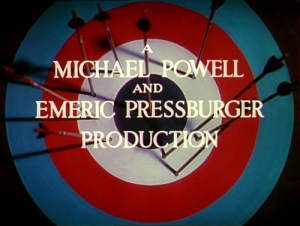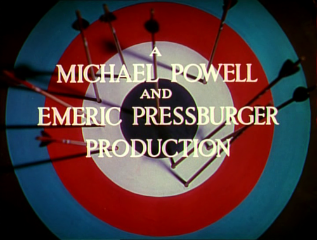
Not for nothing are Michael Powell and Emeric Pressburger the Garreteer film makers par excellence. Their battles against low budgets and wartime authorities should endear them to anyone who has had to deal with pennilessness and bureacracy at the same time, whilst their open propagandizing for less money-obsessed, equal, gentle societies puts them on the side of the Garreteer angels.
Nonetheless, it’s generally considered bad form to consider films as sermons. So let’s do just that. Here are five lessons to be learned from five of the greatest Powell and Pressburger films. All are presented on the understanding that there is a great deal more to each of these films than this (and if you haven’t seen any or all of them yet, you are to be envied!).
Ambitious banker’s daughter Joan is on her way to the remote Scottish island of Killoran to marry a captain of industry and spend the rest of her life in the lap of expensive luxury. But storms prevent her from completing her journey, and instead she falls into the company of the young, impoverished Laird of Killoran, Torquil, who is on leave from the Royal Navy. Torquil, the Scots and Scotland all contrive, bit by bit, to deliver a message to Joan: kindness runs the world, not money, and at the last minute, she turns away from her appointed fate and accepts a poorer yet less straitened life with Torquil.
Generally seen as the movie incarnation of Philip Larkin’s what will survive of us is love, AMOLAD is as much about the power over death of common decency, mutual respect and a certain, very British kind of genial intelligence, all brought together here in Roger Livesey’s portrayal of Dr. Frank Reeves. It’s Reeves’s good gut instinct that leads him to stand up for airman Peter Carter and his new American girlfriend June in the first place; it’s Reeves’s good fellowship that gets Carter into the operating theatre on time. And it’s Reeves’s astonishing calm and insouciance following his own horrifying death in a motorcycle accident that permits him to intervene, selflessly, with the heavenly authorities and become Carter’s advocate in what becomes less of a trial and more of a US v UK cultural battle, turning eventually on radio broadcasts of swing music and cricket:
Escaping Nazis cross Canada: Canadian courage and decency pick them off, one by one. And then the Nazis find themselves overnighting with German religious emigrés, led by Anton Walbrook’s Peter. Vogel, a baker in pre-Hitler days, finds himself again in working his keep with the community, and drifts away from his former colleagues. Peter senses his inner reformation, and offers him a place amongst them after the war, saying, “This is your home”. Just as immersion in a sick society can make sane men forget themselves, a good environment can make them remember. The Nazis kill Vogel in a stage trial and execution before leaving the community, but Vogel’s victory is already won.
The Life and Death of Colonel Blimp
Roger Livesey plays Colonel Candy, a man whose life and career begin in a Great Britain at the very height of her power, and end with her clinging on against a resurgent Nazi Germany. As a young man, he befriends Anton Wallbrook’s Theo Kretschmar-Schuldorff after Theo becomes his unwilling opponent in a duel. In 1940, Theo returns, a refugee, to warn Candy that the fair play and decency that saw him through the Great War is no use against a monster like Hitler: the time had come for the cunning, subterfuge and cleverness shown by young officers like ‘Spud’ Wilson, who “captures” Candy in the opening scenes by disobeying the rules of a practice engagement. There is a time for everything, and friendship can endure even through national enmity and radical changes in fortune.
Pain from bomb disposal expert David Farrer’s amputated foot drives him beyond analgesics onto alcohol, and then into alcoholism. (Troublemaking in a pub, he comes across Sid James in an early role, looking very much like Sid James in late roles). His life, already embittered by mismanagement of his research department, falls apart, and his girlfriend leaves him, taking the cat. Only the death of his friend, blown up attempted to defuse a new type of bomb, shakes him back to himself, and, sobered-up at last, he uses his dead friend’s transcript and all of his own self-possession and experience to defuse another of the new bombs. None of us is immune from personal trauma, decline and disaster – and perhaps none of us is beyond eventual redemption either.
